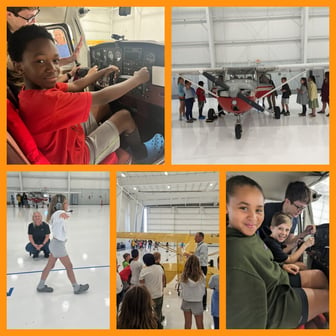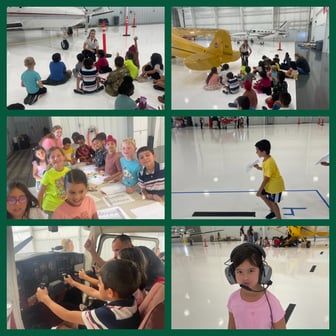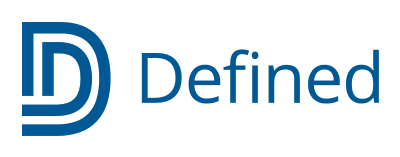Maximizing Engagement Through Regular Immersion in Computer Science
Through project-based learning, students at Winchester Public Schools participated in a "STEM-mersion" program which included an immersive visit to a regional airport. In partnership with Defined Learning, Winchester Public Schools was able to integrate career-connected PBL into their computer science curriculum.
Ancient Egypt. Bat wings. Police officer drones. Weather patterns. Airplane cockpits.
These things may not seem related to you, but to students in Winchester Public Schools, VA participating in this year’s Computer Science Week “STEM-mersion”, there is an obvious connection to the STEM field of aviation. Students at Garland Quarles and John Kerr Elementary schools, serving 843 high-need students, and their teachers visited a regional airport in northwestern Virginia. Every student sat in the cockpit of a plane, learned what a yoke is (the airplane’s steering wheel), and how it works, and trained with pilots at different stations at the airport.
The learning didn’t stop there. When students returned to school, computer science lead teachers for each grade level worked hard to develop Project-Based Learning (PBL) units into the curriculum. From creating passports with directions for how to get to each country students were learning about in social studies, to studying how the adaptations of flying animals led to innovations in aviation, students were immersed in the aviation field all year long.


Winchester Public Schools (Winchester School Board) was awarded an Education and Innovation Research grant in September 2019, with a start date of October 1, 2019, to implement METRICS: Maximizing Engagement Through Regular Immersion in Computer Science. METRICS provides field-initiated innovations that will be tested at two K-4, Title I schools, Garland Quarles Elementary (GQES) and John Kerr Elementary (JKES). These schools provide a strong setting to test strategies that improve student achievement and attainment since they serve a traditionally underrepresented student population where 30% of students speak a language other than English as their first language and over 60% of students qualify for free/reduced priced lunch. The vision is that a whole-school immersion approach to computer science (CS) integrated across the curriculum into the daily classroom and real-world experiences will boost traditionally underrepresented, high-need student aspirations, attainment, and achievement.
Early on, they were determined to use a Project-Based Learning (PBL) approach. Dr. Jennifer LaBombard-Daniels, who leads the project for the district, explains “PBL provided an integrated approach to dive deep into learning computer science skills while maintaining the multiple standards educators are asked to incorporate into their everyday instruction." For their PBL instructional needs, they tuned to Defined. "Defined has been a constant partner for us,” says Dr. LaBombard-Daniels.
According to Jennifer, “Defined’s professional learning team helps us work with our Computer Science Leaders in developing the understanding of what PBL is and how to create lessons. The Defined Learning online platform provides easy, accessible computer science PBL lessons that connect with our Virginia Standards of Learning and integration of Computer Science. We loved that Defined Learning had easy access to units on Computer Science that teachers could adapt immediately into their lessons.” The grant tasked the schools with creating five PBL units for grades K-4 and improving on them each year.
Each year of the grant begins with training for Computer Science leaders at a Curriculum Writing day. Each Computer Science Leader develops or revises their PBL units for their grade level and then takes them back to their school team and develops further there. In addition, the teachers involved in the grant are required to have 60 hours of professional development focused on STEM and computer science. Coaches work with the teachers through four coaching sessions.
Through the five years of the grant, the program had to transition online during the pandemic and is now in “recovery” mode. With a high mobility rate of both students and teachers, it is important to simultaneously continue to develop experienced leaders while also starting over again with new teachers each year. The team works hard to not give teachers more to do, but integrate computer science and PBL into what the teachers are already doing. Over the years, Jennifer and her team have noticed If the teachers use computer science in language arts and math classes, for example, they are more likely to stick with it. “If it is a stand-alone unless they are excited about it, it tends to be pushed to the side or a Friday activity. If they see it easily integrated, they take it and run with it.”
In the early days, immersive training was important. All teachers involved with the grant received a half day of training as well as asynchronous modules to learn about PBL. “If you have no idea what PBL is, there is a lot of unit setup,” Jennifer says. “There is a lot of thought that goes into it. Defined Learning is a great starting point. Once the teachers have been trained in Defined Learning, they can adjust it to their teaching style. They can use it in STEM labs with every student in the school.”
Computer Science is mandated in the state so while the grant is nearing completion and now in the “dissemination” phase, ideally, the work will continue and expand beyond the 2 pilot schools to all 7 schools in the district. Jennifer envisions continuing to coach and provide professional development on how to integrate computer science into the classroom. She is especially excited about the possibility of using Defined Learning to extend “STEM-mersions” to other career fields.
Select teachers have recently had the opportunity to visit Icelandic volcanoes and glaciers and capture 360 camera footage at a Bimini Shark Lab. Perhaps the next STEM-mersion will involve marine biology, geology, or even augmented reality! Either way, students and teachers will surely continue to be amazed by the many ways computer science is integrated into their daily lives!
About the Author:
Jennifer LaBombard-Daniels directs the METRICS Grant for Winchester Public Schools in Virginia and is an adjunct professor in the School of Education and Leadership at Shenandoah University. In her 24 years of education, Dr. LaBombard-Daniels has served as a STEAM Teacher, elementary teacher, middle school science teacher, and chair for her science department. She served as an Assistant Professor of Education at Colorado Mesa University, a K-12 Projects Specialist with Washington County Public Schools in Maryland, and Science Department Leader and Teacher in Columbia, Maryland.
Among her many awards and achievements, Dr. LaBombard-Daniels’ team was most recently awarded 12 VA 2023 Computer Science Educator of the Year Nominees with one category winner. Her team was also featured in the Associated Press for their work in connecting computer science with urban farming and won The National STEM Honors Societies Chapter of the year, 2021. She was nominated for the K12 Innovations in Technology Award, in 2020, was awarded JKES Teacher of the Year, in 2019, and was nominated CMU’s Professor of the Year, in 2017. She has also earned the NASA In-flight Downlink Commemorative Award in 2016 for which her NSTA Student Chapter was awarded Chapter of the Year for their work with this project, and was invited to the Congressional Reception through Loyola College in Baltimore. Jennifer earned her Ph.D. in K-12 Educational Leadership, Walden University-Baltimore; a Masters of Education, Curriculum and Instruction, Loyola College-Baltimore, and a B.A., Literature, State University of New York Oswego State- Oswego, NY.
Learn More About Career Connected Learning @ Defined
Discover how Defined Learning helps students build future-ready skills through project-based learning, STEM, and career exploration.

%20copy-1.png)